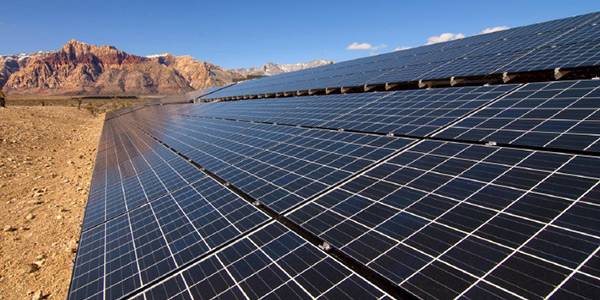[UPDATED Nov. 9 11:25 a.m. ET to reflect election results.]
A measure in Nevada to enshrine a clean energy mandate in the state constitution is heading to victory, while New Mexico voters approved an overhaul of their state’s Public Regulation Commission, and Arizonans elected another Democrat to the state’s Corporation Commission.
Votes remained uncounted in Nevada, but ballot Question 6 was leading 57% to 43% as of Sunday night, according to the secretary of state’s website. The measure asked voters for the second time in two years if the state should make clean energy goals a part of its constitution.
A law signed by Democratic Gov. Steve Sisolak in April 2019 requires the state to get half its electricity from non-carbon-emitting resources by 2030, but environmentalists worried it could be overturned by elected officials if the political winds shift and sought a more permanent solution.
Amendments to Nevada’s constitution must be approved in two consecutive elections, so the question faced a final vote this year after winning 59% support in 2018. That effort, like the current one, was bankrolled by California billionaire and environmental activist Tom Steyer. (See Climate Policy on the Ballot Tuesday.)
New Mexico
New Mexicans voted 55% to 45% for a constitutional amendment to revamp the PRC from a five-member body elected by district to a three-member body of at-large utility commissioners appointed by the governor.
A nominating committee will make recommendations of “professionally qualified nominees” under the measure, which prohibits more than two of the PRC’s members from belonging to the same political party. The new law replaces commissioners’ staggered four-year terms with six-year appointments.
It takes effect Jan. 1, 2023, ending the terms of elected members at the close of 2022.
Two members of the PRC backed the ballot measure, arguing that utility regulators should have experience in the complex field. Some of those elected to the PRC lack the backgrounds needed to understand and rule on regulatory issues, Commissioners Cynthia Hall and Stephen Fischmann wrote in an opinion piece published in a number of the state’s newspapers.
“The public and the utility companies that serve them deserve to have commissioners with meaningful expertise when they begin working as commissioners,” Hall and Fischmann wrote. “That means graduate-level education plus significant industry or regulatory experience. Commissioners should be experts at the outset, not rookies.”
Hall was re-elected to a two-year term on the commission Tuesday; Democrat Joseph Maestas was newly elected to an open seat.
Other members of the PRC contended that allowing the governor to appoint its members would deprive voters, especially those in rural disadvantaged communities, of the opportunity to influence ratemaking and policy decisions.
“There is no requirement for any sort of geographic representation, which makes it extremely likely that the commission would be dominated by members from the urban population centers rather than rural New Mexico,” Commissioners Theresa Becenti-Aguilar and Jefferson Byrd wrote in a competing op-ed.
Commissioners were also divided in their support of a landmark law from 2019 that requires the state’s investor-owned utilities to get 100% of energy from carbon-free sources by 2045. Both Hall and Maestas support the measure.
Arizona
In a close and contentious race for three seats on the ACC, Democratic newcomer Anna Tovar led a pack of six candidates to win election, along with two Republicans. Tovar, one of a slate of three Democrats backed by New York billionaire Michael Bloomberg, secured nearly 18% of votes cast.
Republican incumbent Lea Marquez Peterson came in second with 17%, closely followed by Republican Jim O’Connor, who had a similar vote tally.
Left behind were Democrats Bill Mundell and Shea Stanfield and Republican Eric Sloan, each of whom fell short of the top three vote getters.
Potentially at stake in the race is an Oct. 29 commission decision to adopt a 100% clean energy mandate by midcentury. California, New Mexico and Washington also have 100% clean-energy
The commission, which currently has four Republicans and one Democrat, voted 3-2 for the mandate. Chairman Bob Burns and Commissioner Boyd Dunn, neither of whom sought re-election, voted with Democrat Sandra Kennedy in support of the measure.
With the two Republicans winning office, the decision could be reversed. Republican Commissioner Justin Olson expressed his dismay with the potential cost to ratepayers in a statement after the Oct. 29 vote. Marquez Peterson opposed the move. And O’Connor said he would vote to reverse the decision if elected, The Arizona Republic reported.




